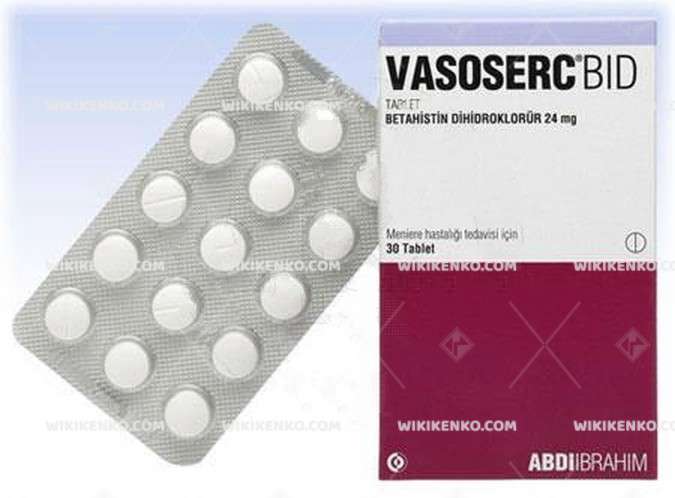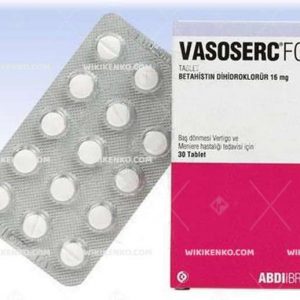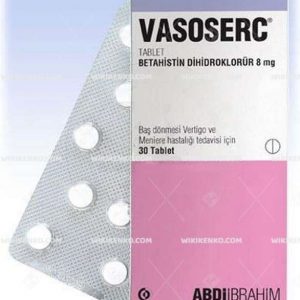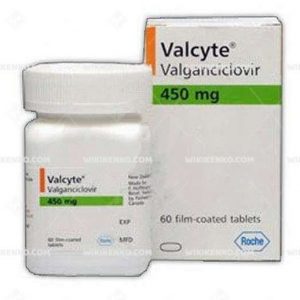Vasoserc Bid Tablet
Ménière’s disease is a condition that affects the inner ear, causing vertigo and tinnitus. These symptoms can significantly impact a person’s quality of life and ability to carry out daily activities. Fortunately, Vasoserc Bid Tablet, an anti-vertigo medication, can help alleviate these symptoms. In this article, we will provide a comprehensive guide to Vasoserc Bid Tablet, including its mechanism of action, uses, and potential side effects.
| Potency | 24 Mg |
|---|---|
| Manufacturer | |
| Origin | |
| Generic Name (Ingredient) | Betahistine Dihydrochloride, 24 Mg (Equivalent To 15.63 Mg Betahistine) |
Assuming your emergency circumstances for this product, visit Urgent Quotation page. Besides, for any pharmaceutical questions, please ask us in the comments section.
Description
Mechanism of Action
The active ingredient in Vasoserc Bid Tablet is betahistine, which has a multifactorial mechanism of action. Betahistine has a strong affinity as an antagonist for histamine H3 receptors and a weak affinity as an agonist for histamine H1 receptors. The medication has two modes of action. Firstly, it has a direct stimulating effect on H1 receptors located on blood vessels in the inner ear. This action reduces the pressure in the endolymphatic space, which leads to a decrease in vertigo symptoms.
Additionally, betahistine has potent antagonistic effects at H3 receptors, which increases the levels of neurotransmitters released from nerve endings. This action stimulates H1 receptors, augmenting the direct agonistic effects of betahistine on these receptors. Therefore, betahistine has powerful vasodilatory effects in the inner ear, making it effective in treating vertigo.
Usage
Vasoserc Bid Tablet is clinically useful for relieving vertigo and dizziness. It dilates precapillary sphincters, which increases blood flow in the inner ear. Additionally, it controls capillary permeability in the inner ear, which removes endolymphatic hydrops. Vasoserc Bid Tablet also improves cerebral circulation by increasing blood flow in the internal carotid artery. Therefore, it is an effective treatment option for Ménière’s disease.
How it Works?
Vertigo is a disturbing sensation of movement caused by dysfunction of the labyrinth (inner ear), vestibular nerve, cerebellum, brainstem or Central Nervous System (CNS). Ménière’s disease is thought to result from disruption of endolymphatic fluid homeostasis in the ear. Vasoserc Bid Tablet mainly acts as a histamine H1-receptor agonist. Stimulation of H1-receptors in the inner ear causes a vasodilatory effect leading to increased permeability of blood vessels and reduction in endolymphatic pressure.
This action prevents rupture of the labyrinth, which can contribute to hearing loss associated with Ménière’s disease. Vasoserc Bid Tablet is also purported to act by reducing asymmetrical functioning of sensory vestibular organs and increasing vestibulocochlear blood flow, relieving symptoms of vertigo.
Side Effects
Common side effects of Vasoserc Bid Tablet include headache, occasional drowsiness, nausea, indigestion, and mild gastric complaints such as vomiting, stomach pain, and bloating. However, these side effects are generally mild and well-tolerated.
Conclusion
Vasoserc Bid Tablet is a medication used to alleviate the symptoms of Ménière’s disease, including vertigo and tinnitus. Its mechanism of action involves stimulating histamine H1 receptors in the inner ear, leading to vasodilation and reduction of endolymphatic pressure.
The medication also helps to control capillary permeability and increase blood flow in the internal carotid artery, making it useful in relieving vertigo and dizziness. Although Vasoserc Bid Tablet has some side effects like headache, occasional drowsiness, nausea, and stomach discomfort, it remains an effective treatment option for people living with Ménière’s disease.
Use the form below to report an error
Please answer the questions as thoroughly and accurately as possible. Your answers will help us better understand what kind of mistakes happen, why and where they happen, and in the end the purpose is to build a better archive to guide researchers and professionals around the world.
The information on this page is not intended to be a substitute for professional medical advice, diagnosis, or treatment. always seek the advice for your physician or another qualified health provider with any questions you may have regarding a medical condition. Always remember to
- Ask your own doctor for medical advice.
- Names, brands, and dosage may differ between countries.
- When not feeling well, or experiencing side effects always contact your own doctor.
Cyberchondria
The truth is that when we’re sick, or worried about getting sick, the internet won’t help.
According to Wikipedia, cyberchondria is a mental disorder consisting in the desire to independently make a diagnosis based on the symptoms of diseases described on Internet sites.
Why you can't look for symptoms on the Internet
If diagnoses could be made simply from a textbook or an article on a website, we would all be doctors and treat ourselves. Nothing can replace the experience and knowledge of specially trained people. As in any field, in medicine there are unscrupulous specialists, differences of opinion, inaccurate diagnoses and incorrect test results.






Reviews
There are no reviews yet.